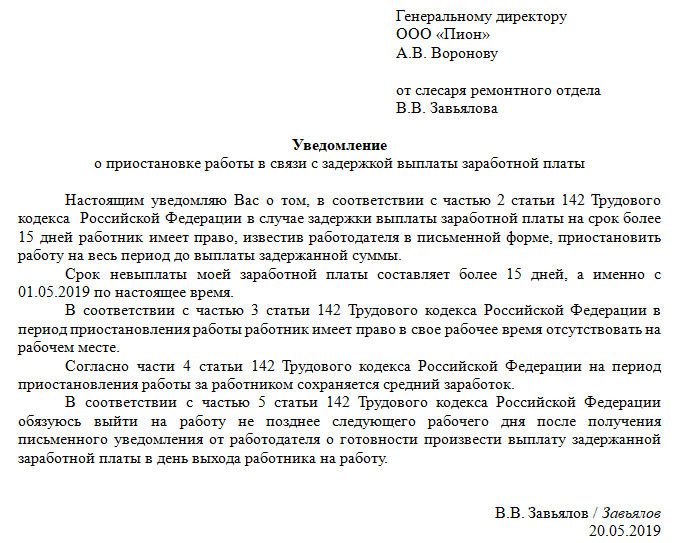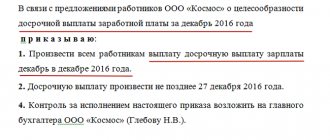What is stated in the labor code about salary delays
Salaries must be issued to employees at least twice a month. This is regulated by the provisions of Art. 136 Labor Code of the Russian Federation. Delay, regardless of duration, is a violation of the law. If it occurs, the employer is held liable, and the organization pays compensation to the employee.
Issues of delayed payments are regulated by the following legislative acts:
- Clause 2 of Article No. 5 of the Code of Administrative Offenses of the Russian Federation;
- Clause 1 of Article No. 145 of the Criminal Code of the Russian Federation;
- Art. No. 122, 223 and 225 of the Tax Code of the Russian Federation;
- Art. No. 151, 195, 314 Civil Code of the Russian Federation.
IMPORTANT! Article No. 136 of the Labor Code does not establish specific days when the employee must receive payments. The dates are regulated by local regulations of the companies, but there should not be more than 15 days between them.
When a citizen is dismissed, transferred to another place, or a fixed-term employment contract expires, funds are issued not according to schedule, but on the last working day.
Delayed salary: what should an employee do?
According to the Labor Code of the Russian Federation (Article 136), an employee must receive wages for his work at least 2 times a month. As a rule, at the end of the month for which the salary is accrued, an advance is paid, and the next month, no later than the 15th day, the employee receives the rest of the salary (for the previous month). The exact terms of payments are determined by the employment contract and internal documents of the organization.
If an employee has not received his salary on time, he has the right to monetary compensation, which the employer is obliged to calculate and pay, regardless of whether he is at fault. It is calculated starting from the next day after the due date for payment until the day of actual payment of the debt, inclusive, according to the formula (Labor Code of the Russian Federation, Article 236):
Amount of debt x Number of days of delay in payment x 1/150 of the current Central Bank key rate.
The employee must receive compensation along with the salary paid later than due. If the employer does not accrue it, the employee has the right to complain to the labor inspectorate or seek compensation through the court.
If salary (any part of it) is delayed for more than 15 days, the employee can suspend work in the organization that does not pay him money. That is, temporarily stop performing work duties until the employer pays him off. The law allows him to be absent from the workplace (Labor Code of the Russian Federation, Article 142). However, such a suspension of work is possible under two conditions:
- the employee is obliged to notify the employer in writing about the suspension of work, indicating the reason;
- he should not be included in the categories of employees who are prohibited from suspending work (their list is specified in Article 142 of the Labor Code of the Russian Federation, in particular, these include civil servants, doctors and ambulance drivers, emergency services, etc.).
Such a suspension is not considered absenteeism. Moreover, the employer will have to retain the employee’s average earnings for the entire period of suspension.
If there is a delay in wages, the employee can write a complaint to the labor inspectorate or call the Rostrud hotline by phone, or file a complaint online by filling out a form on the website “]]>Onlineinspektsiya.rf]]>”. The supervisory authority will conduct an inspection and, if the facts are confirmed, the employer faces administrative liability.
When the fact of violation of labor legislation is established, the employee has the right to resign of his own free will within the period specified in his application, i.e. without 2-week work (Labor Code of the Russian Federation, art.). Failure to pay wages on time is one type of such violation.
The employee also has the right to go to court and recover from the employer not only delayed wages and compensation, but also compensation for moral damage if he proves that it was received in connection with untimely payment of wages. Moral damage to an employee can be compensated by the employer on a voluntary basis - by agreement of the parties (Labor Code of the Russian Federation, Article 237).
How is an employer responsible for delayed wages?
The employer is liable for any delay. The following sanctions apply to the enterprise and responsible persons:
- disciplinary action (reprimand, reprimand or dismissal of the employee who caused the violation);
- administrative liability (fine);
- criminal liability.
According to Art. 5.27 of the Code of Administrative Offenses the following fines are imposed for late wages:
- for officials – from 1 to 5 thousand rubles;
- for individual entrepreneurs – from 1 to 5 thousand rubles;
- for organizations - from 30 to 50 thousand rubles.
Repeated delay in salary leads to an increase in the amount of the fine:
- for responsible employees – up to 10–20 thousand rubles;
- for individual entrepreneurs – up to 10–20 thousand rubles;
- for companies – up to 50–70 thousand rubles.
In some cases, prosecution occurs in accordance with the provisions of Art. 145.1 of the Criminal Code of the Russian Federation:
- if the debt is paid in less than half;
- if the period of delay is more than three months;
- if it is proven that the debt arose for personal gain.
Criminal liability is expressed as follows:
- fine up to 500 thousand rubles;
- monetary penalty in the amount of income for a three-year period;
- disqualification for up to 5 years;
- compulsory community service for up to 3 years;
- imprisonment for up to 3 years.
The extent of the employer's liability depends on the severity of the violation.
Manager's responsibility for late payments to employees
The law defines the responsibility of managers for delayed payment of wages, as well as for refusal to pay compensation for delayed wages to employees.
Art. 134, 195, 342 of the Labor Code of the Russian Federation provide for disciplinary liability of employers. According to these articles, the employer, upon application of the trade union organization/other representative body of workers in the organization, is obliged to take the measures prescribed by law in relation to the manager who has committed late wages.
Disciplinary measures may include a reprimand or dismissal. The owner of the organization has the right to choose the method of punishment. If, due to violation of the terms of payment of wages, the payment of compensation caused material damage to the company, the employer has the right to go to court for compensation for damages through recovery from the violating manager. The court has the right to decide on recovery from the guilty party if guilt can be proven.
In addition to disciplinary liability, administrative liability is also provided. In accordance with Art. 27 of the Administrative Code, the head of an organization who delays wages and refuses compensation will face an administrative fine in the amount of 30 to 50,000 rubles.

Photo: pixabay.com
What should an employee do if their salary is delayed?
If a delay occurs, the citizen must send an appeal to the manager. There is no unified form for its preparation. The letter requires the following information:
- personal information of the employee (full name, title of position, name of structural unit);
- details of the person to whom the appeal is sent (full name, position, name of organization indicating the form);
- a description of the circumstances surrounding the occurrence of the debt, indicating the dates;
- request for negotiations.
If the complaint does not receive a response or funds are not paid within 15 days after the letter, the employee has the right not to go to work. However, this is not considered absenteeism. However, the following employees cannot suspend their work:
- ensuring the security of the state and the livelihoods of the country's population;
- performing emergency, search or rescue operations;
- law enforcement agencies;
- hazardous industries.
Suspension of activities is also impossible during a current martial law or state of emergency in the state.
Employee rights
If an organization does not pay remuneration for labor (or other payments within the framework of labor relations, such as vacation pay) for more than 15 days, then the employee can suspend his work activity (Article 142 of the Labor Code of the Russian Federation).
You must notify your employer of this in writing.
Sample

During a suspension of work, the employee has the right not to be present at the workplace. During this time, he retains his average earnings.
In such a situation, the employee is obliged to return to work on the next working day either after receiving all the money due to him, or after receiving written notification from the company about its readiness to fully repay the debt to him.
This right cannot be used:
- employees working at enterprises providing life support to the population;
- workers of particularly hazardous industries;
- civil servants;
- military personnel, employees of state security agencies, fire fighting and emergency rescue services;
- during a state of emergency or martial law.
Also, to protect their interests, any employee who has not received their wages on time can file a complaint with the Labor Inspectorate, the Prosecutor's Office or the court.
Where to go if your salary is delayed
If it is not possible to resolve the issue by sending a letter and negotiations with the manager, the citizen can contact the following institutions:
- Labour Inspectorate;
- courts;
- prosecutor's office
ADVICE! It is necessary to provide these institutions with maximum evidence of violation of employee rights. These may be a copy of the sent complaint, a copy of the company’s regulations with the dates of salary accrual, a bank account statement, etc.
Labour Inspectorate
The employee is required to draw up an application, collect a package of documents confirming the fact of the violation and provide it in the following ways:
- personally;
- by mail;
- through a representative.
Upon receipt of the application, inspection staff must initiate an inspection of the company’s activities. The period for consideration of the complaint is 30 calendar days.
Prosecutor's office
You need to contact the prosecutor's office in cases where the delay is long and the employee intends to additionally recover moral damages.
The application is drawn up in free form and sent to the law enforcement department at the location of the company's office.
Court
If the employee’s actions do not bring results, he should go to court. To do this, you need to collect documents, fill out a statement of claim and submit it to the district court at the location of the enterprise. The statute of limitations for such cases is 1 year.
The application must indicate:
- name of the court;
- personal data of the applicant (full name, date of birth, address of registration and actual place of residence, contact information);
- information about the organization (name, registration form, legal address, full name of the head);
- description of the violation with dates;
- reference to a legislative act (Article 236 of the Labor Code of the Russian Federation);
- list of requirements;
- list of documents attached to the application;
- Date of preparation;
- signature.
A sample statement of claim is available here.
In what cases can punishment be avoided?
Since January 2021, the legislation has been amended to determine in which cases an employer is exempt from criminal liability. According to Federal Law dated December 27, 2018 N 533-FZ, several conditions must be met simultaneously:
- wages were delayed for the first time;
- the debt to the employees was repaid within two months from the date of initiation of the criminal case;
- the employee received compensation for delayed wages;
- no other crime has been established in the employer’s actions.
Only the presence of these conditions together will allow you to avoid punishment.









